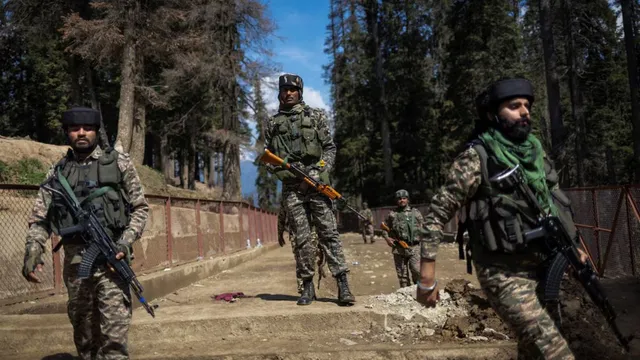- By Supratik Das
- Sun, 25 May 2025 06:03 PM (IST)
- Source:JND
Informal diplomatic engagement between Indian and Pakistani officials in neutral, third-party states can lead to de-escalation, say top UK strategic analysts. The International Institute for Strategic Studies (IISS), a UK-based think tank, recently hosted a senior-level meeting to discuss the future of India-Pakistan ties in the aftermath of a recent military escalation. The discussion, titled “The India-Pakistan Military Conflict and Prospects for Regional Stability and Security,” highlighted the fragile state of bilateral ties and the absence of formal diplomatic engagement between the two nuclear-armed neighbors.
Rahul Roy-Chaudhury, a Senior Fellow for South and Central Asia at IISS, identified India and Pakistan as having come out of their just concluded 100-hour war with sharply “differing and disputed narratives.” He emphasized India's unyielding position of no trade or talks with Pakistan until terror attacks on Indian targets stop. “India has clearly stated that any future dialogue will only address issues of terrorism and the return of Pakistan-occupied Kashmir (PoK),” said Roy-Chaudhury. “Pakistan, on the other hand, is expected to contest these conditions and is actively seeking international intervention.”
Without formal avenues, Roy-Chaudhury emphasised that informal or 'Track 1.5' conversations, that is an unofficial negotiations between ex-officials and experts from both sides conducted in third-country nations, can be the "best immediate hope" for establishing regional stability. “Such dialogues could help rebuild communication lines and reduce the risk of miscalculation,” he added.
All-Party Indian Delegation On Counter-Terrorism Tour in Europe
The meeting came days ahead of an Indian all-party delegation, headed by top BJP leader Ravi Shankar Prasad, that was to arrive in Paris. The delegation aims to spell out India's counter-terrorism stance and explain its motives for Operation Sindoor, which was initiated in the wake of the April 22 Pahalgam terror attack in which 26 people were killed. "This visit will serve as a strong reinforcing instrument to create an 'all-India consensus' in South Asia on counter-terrorism and develop a world awareness initiative for threats originating from the other side," Roy-Chaudhury added.
Desmond Bowen, IISS Associate Fellow for South and Central Asia, cautioned about the increased threat of misperception between the two countries, particularly in the wake of recent drone and missile attacks. "Global alarm is due to fear of nuclear war. Deterrence on each side appears precarious, and the risk of strategic misperception is much greater today than in previous years," he said. Another IISS Senior Fellow, Antoine Levesques, noted that India has used its military operation to enhance its Make in India defence industrial narrative. “This successful use of indigenously developed military equipment has long-term implications for India’s position as a potential arms exporter,” said Levesques.
Ceasefire Stability Under Question
Viraj Solanki, IISS Research Fellow, noted that the lack of a joint India-Pakistan statement declaring the May 10 ceasefire puts it under question regarding its sustainability.“Unlike the 2021 ceasefire agreement, which held for nearly four years, the current truce is fragile due to conflicting narratives among India, Pakistan, and even the United States,” said Solanki.
ALSO READ: Pakistan Shopping For Mini-Nukes To Match India's Desi Arsenal | US Report Reveals Truth

